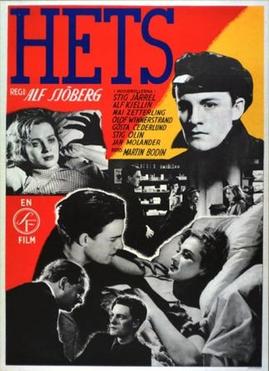
The feature for the evening was Torment (Hets in Swedish), an Ingmar Bergman screenplay directed by Alf Sjöberg (although apparently Bergman did have a hand in directing it too). The movie was being shown at the Iglesia Sueca de Buenos Aires, or Swedish Church, located in the San Telmo district of the city. Since I miss Stockholm a lot—and haven't spoken Swedish hardly at all in the past year, except for a headache-inducing Skype conversation with the tax authorities—I thought I'd get out of the Recoleta bubble and make my way over there. For 20 pesos ($4), it wasn't a bad price for a movie and drinks.
The film itself was a picture of sadism, and had all the hallmarks of Bergman features to come. It dark and tumultuous, but ended sunnily; apparently Bergman had wanted the ending to be darker, but Sjöberg vetoed it. The moving showing was billed as a "film debate" on the Swedish Embassy website, but I was surprised to find that I was one of just two people that spoke Swedish there. Everyone else was Argentine, and had some sort of connection with Sweden, be it the church or family members or interest in Swedish cinema or anything really. After the movie, I started talked to a woman named Monica who has been married to Sven, the other Swedish speaker there, for 38 years. Sensing my Spanish deficiencies, she spoke slowly and clearly so I could understand, and helped me along in the conversation. When I asked her the best taxi service to call, she insisted on giving me a ride home, so I ended up sharing the backseat of their car with her 96-year-old mother.
They let me in on another Swedish event: Midsommarfest, put on by El Club Sueco, the Swedish Club headquartered in the same building as the Embassy. I think it'd be fun to go—I was lucky enough to spend the last two Midsummers in Sweden, and I have a mind to see how the Argentines celebrate the illustrious pagan holiday. I suppose it's kind of odd to be seeking out Swedish activities in Buenos Aires, but the truth is that I just spoke more Spanish at this movie night than I did all last week.
But some things I don't even have to seek out. The very first thing I saw in the grocery store was jam made from fläderbär (elderberry) and nypon (rose hip).

And even the milk comes in the same familiar TetraPak package with the perforated tab on the upper corner. Well, some of the milk anyway—the first time I went to the grocery store, I could only find milk in bags. A wobbly plastic bag filled with milk. I admit, I was perplexed—how does one store milk in a plastic bag? When I expressed my dismay to Toti, an Argentine lawyer from the firm who is leaving soon to do a Master of Laws at Northwestern, she just laughed, saying that nobody actually buys the milk in bags. They buy the milk en cartón, the leche larga vida, highly-pasteurized milk that you don't even have to refrigerate until you open it. Truth be told, it's pretty much the same as the "haltbare Milch" you get in Germany. I doubt I'll ever be as enthusiastic about it as Thomas though:


i have three comments:
ReplyDelete1. mmm, bag milk
2. sounds like a fun movie event!
3. actually, i just had two comments. happy sunday.